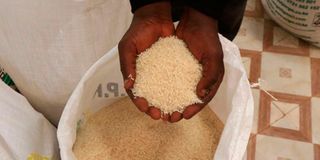Premium
Push for Kerio Valley pastoralists to grow rice

The government has introduced a new high-yielding seed variety -New Rice for Africa (Nerica) - that is suitable for highland regions and takes 105 days to mature.
The government has launched an ambitious programme to encourage pastoralists in the Kerio Valley region to venture into rice farming and benefit from the high demand for the cereal.
The Ministry of Agriculture initiative seeks to motivate livestock farmers in Baringo, West Pokot, Trans Nzoia and Elgeyo-Marakwet counties to invest in rice production as an alternative source of income and for food security.
The government has introduced a new high-yielding seed variety -New Rice for Africa (Nerica) - that is suitable for highland regions and takes 105 days to mature.
The species, according to an annual agricultural report released in March, yields up to 4.5 tonnes per hectare in the Kerio Valley, with a potential of five to six tonnes per hectare.
Rift Valley harvested 167,130kg of rice from 57 hectares last season up from 31,500 tonnes from 57 hectares the previous years as farmers in the Kerio Valley turn to the cultivation of the crop.
“The region has big potential for the production of Nerica, especially in the counties of Elgeyo-Marakwet, Baringo, West Pokot, Turkana, Samburu and Kajiado, which have good climatic and soil conditions for the production of the crop,” the report said.
More than 1,000kg of the rice seed was delivered to the National Irrigation Board’s Perkerra scheme in Baringo County last season by the Japanese International Corporation Agency (Jica) for distribution to farmers.
“Farmers within irrigation schemes in Marigat area are currently being used to bulk Nerica seed for Kenya Seed Company,” the report said.
Inadequate rainfall for rice production has been cited as a limitation for most farmers, which can be mitigated through harvesting water for irrigation.
Inadequate planting materials and lack of sufficient threshing and milling machines are some of the challenges facing rice farmers in the region.
“Competing farm activities such as maize, wheat and sorghum cultivation that coincide with rice production and damages to the crop caused by termites and birds (remain) a challenge to most farmers,” explained the report.
The government has, however, embarked on recruiting potential rice farmers as common interest groups and investing in modern production techniques.
Other strategies to improve rice cultivation in the region include setting up demonstrations on farmers’ plots and exposure tours to areas like the largely successful Mwea Irrigation Scheme.
Trigger greater productivity
But cotton farmers in the region have petitioned the government to set up a stabilisation fund to offer them a guaranteed market and better returns from the produce.
They argued that the fund will cushion them from unpredictable prices and trigger greater productivity to sustain a steady supply of yarn to the textile industry.
“A steady market and allocation of adequate funds to invest in modern production techniques will result in increased cotton production and cut down the costs of importing the raw material,” said James Yatich, from Salawa in Baringo County.
The farmers complained about reduced market prices for the produce from Sh52 to Sh48 per kilogramme, arguing that it subjects them to losses due to high production costs from farm inputs and fuel.
They claimed the government had set the price at Sh52 per kilogramme but middlemen had slashed the prices to Sh48.
“We had requested the government to increase the prices to Sh60 per kilo. Instead, the middlemen have slashed them by Sh6 per kilo. Although the payment is prompt, we urge the government to review these prices due to increased costs of production,” noted Peter Bargetuny, a cotton grower in Chegilet, Elgeyo-Marakwet County.
He supplies the produce to the Salawa cotton ginnery in Baringo County that ends up at Rivatex in Eldoret.
Henry Komen, another farmer, petitioned the government to create a special fund to stabilise and cushion them from price fluctuations in local and international markets.
“We want this fund created to ensure we get constant prices. That will motivate more farmers to cultivate the crop in the country,” Mr Komen said.
The growers also urged the government to consider offering job opportunities at Rivatex to locals from the cotton-growing region as that could help promote the cultivation of the crop.
Last November, Agriculture CS Peter Munya launched a national distribution of BT seeds to revitalise cotton production and boost the revival of the textile industry ahead of the planting season.
Rivatex used to produce millions of tonnes of fabric before it was placed under receivership in 2000 following mismanagement.
In 2007, Moi University bought the firm but has struggled to produce finished products due to obsolete equipment.
In 2018, the firm was upgraded for Sh3.016 billion, including a grant from the Indian government and an additional Sh3 billion from the Treasury.
The loan from India was for replacing obsolete machines and transferring technology. It followed a visit to Kenya by Indian Prime Minister Narendra Modi in 2017.
Cotton farming collapsed in the mid-1990s following massive bollworm attacks and high production costs. This made conventional cotton farming unprofitable.





